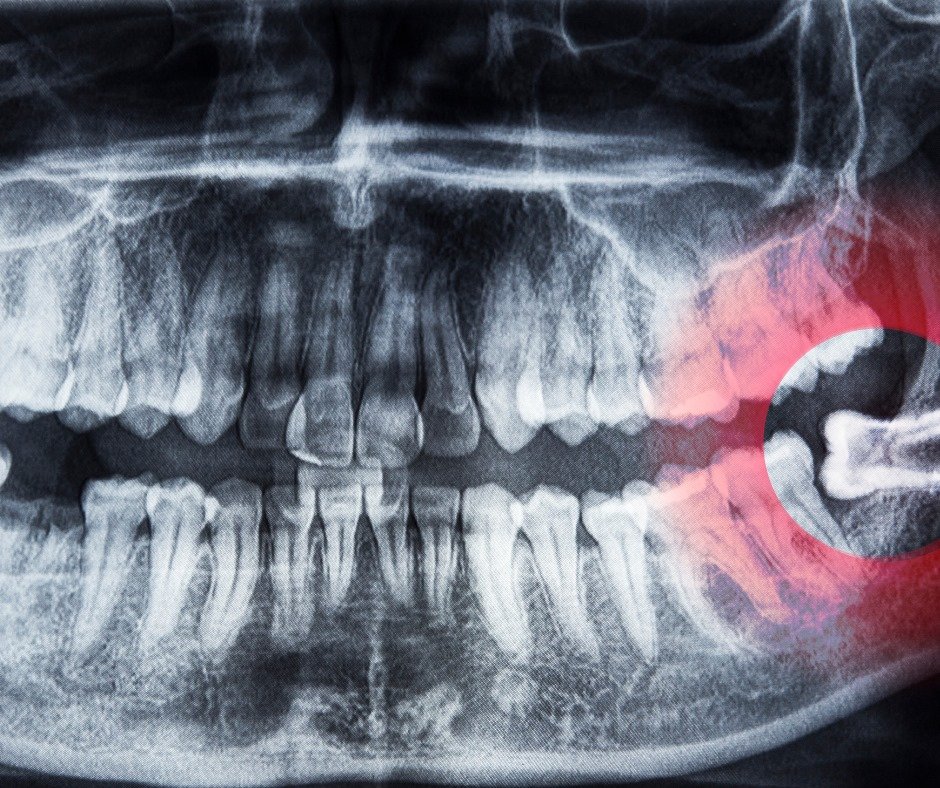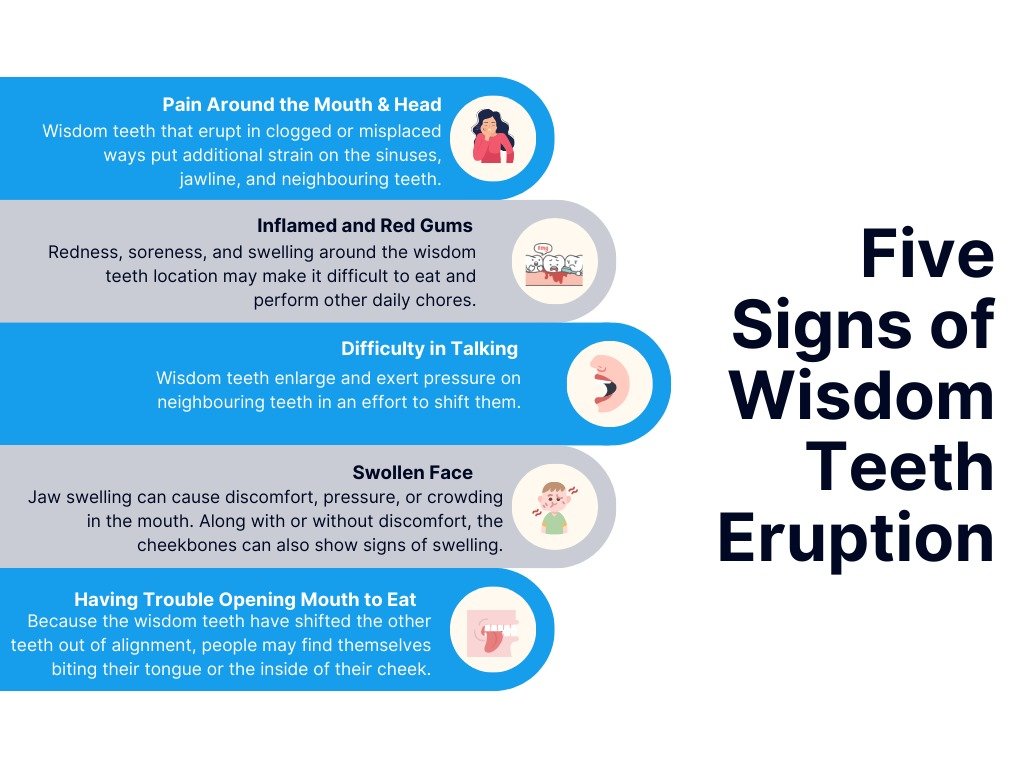A Breakdown Of Development: When Do Wisdom Teeth Grow In
Many of us wonder when do wisdom teeth grow in.
Well, it is not a one-answer kind of situation. Wisdom teeth usually come in between the late teens and early twenties. To give a number, you can expect them to grow at the age of 17 to 25 years.
In various phases of life, as the body develops, our teeth go through some transformative changes.
A part of this process includes the eruption of wisdom teeth. These are the third molars that grow earlier or later in life without serving a definitive purpose.
Here, we have collected all the details about wisdom teeth and their development.
Learn More: Are You Ready for Wisdom Teeth Removal? Here's What to Expect
When Do Wisdom Teeth Grow In?
The last permanent teeth that erupt are third molars, sometimes known as wisdom teeth.
In the very back of your mouth, you may start noticing them as they start to grow.
According to research, wisdom teeth may start growing significantly earlier. Often by the age of nine, it can begin as early as age five. However, they may not erupt until early adulthood.
The crown starts to form when the tooth calcifies first. Following the development of the root, the teeth eventually show through the gums.
When Do Wisdom Teeth Grow In: How to Determine
Wisdom teeth are different from other permanent teeth because of this complete process, which can take several years and vary greatly in timing.
They may appear earlier in men than in women, with the upper molars usually coming in sooner.
Most people stop experiencing discomfort or difficulties with their wisdom teeth beyond the age of thirty, and issues typically arise between the ages of fifteen and twenty-five.
Teeth are arranged according to where they are and what they do. While the flatter teeth at the back of your mouth grind down food, the sharper teeth toward the front of your mouth break food into smaller bits.
Humans grow their initial set of baby teeth from birth until early adolescence, then lose them and get a brand-new set that they will never lose.
The majority of adults will grow their third set of molars, which are the furthest back.
This third pair of molars may have been necessary due to the harsh diets of our ancestors, who likely ate raw food. However, today, we have the resources to cook our food until it becomes soft.
Therefore, there is no need for us to tolerate the wisdom tooth pain for the extra tooth.
Some wisdom teeth may not erupt fully, or they may not erupt normally and stay impacted.
Knowing when do wisdom teeth grow in can help at the time of extraction.
5 Signs of Wisdom Teeth Eruption
If you are thinking about how you can tell when do wisdom teeth grow in, you will have to watch out for the following signs:
1.Pain Around the Mouth & Head
Wisdom teeth that erupt in clogged or misplaced ways put additional strain on the sinuses, jawline, and neighbouring teeth.
They can even result in persistent migraines. Pain, stiffness, and discomfort follow. Furthermore, the pain gets worse when the wisdom teeth erupt and press against bone and nerves.
So, if you are experiencing a similar situation, check for other symptoms too related to when do wisdom teeth grow in.
Read More: 10 Reasons Behind Jaw Pain on One Side
2.Inflamed and Red Gums
Redness, soreness, and swelling around the wisdom teeth location may make it difficult to eat and perform other daily chores.
Another sign of a wisdom tooth is gum irritation, which should be taken seriously. This means you should schedule a cleaning and follow up with some post-treatment brushing and flossing.
3.Difficulty in Talking
Wisdom teeth enlarge and exert pressure on neighbouring teeth in an effort to shift them. This causes the gums and jaw muscles to swell, further constricting the mouth.
Additionally, the tongue may swell and obstruct the mouth when eating or speaking.
4.Swollen Face
Jaw swelling can cause discomfort, pressure, or crowding in the mouth. Along with or without discomfort, the cheekbones and other regions can also show signs of swelling.
5.Having Trouble Opening Mouth to Eat
Because the wisdom teeth have shifted the other teeth out of alignment, people may find themselves constantly biting their tongue or the inside of their cheek.
When to Get Rid of Wisdom Tooth
Usually, the question when do wisdom teeth grow in is answered by the toothache caused by it.
Particularly, when the wisdom tooth is impacted, you won't be able to ignore the signs of it.
These are the reasons behind wisdom tooth pain, and mostly when these signs appear, you need to opt for wisdom tooth extraction:
Related Blog: 10 Wisdom Tooth Infection Symptoms You Will Regret Ignoring
1.Gum Disease Inflammation
When food particles, plaque, and germs penetrate your gum line, gum inflammation may happen.
Swollen or inflamed gums are an obvious and frequent indicator that your wisdom teeth may have partially or fully emerged.
The tissue in the back of your mouth surrounding your teeth will swell, turn red, and become touch-sensitive.
Inflamed gum tissue is one of the most common signs that wisdom teeth need to be extracted as soon as possible.
When your wisdom teeth crowd other teeth by putting pressure on your jaw, which is often indicated by stiffness in the jaw.
2.Dental Decay
Tooth decay results from wisdom teeth's disruption and harm to good teeth. If you put off getting your wisdom teeth extracted, the rest of your good teeth may eventually get pushed out of alignment and contaminated.
You are putting yourself at risk for severe dental issues and wisdom tooth pain if you choose to ignore or bear with the sensitivity or pain in your mouth.
As soon as you experience any jaw stiffness or pain, schedule an examination for wisdom teeth from a qualified dental clinic.
3.Cysts in the Mouth
Untreated, impacted wisdom teeth can lead to the development of cysts, which are sacs of fluid in your jaw, gums, and oral tissue. So, it's not just wisdom tooth pain that you are dealing with.
Cysts eventually lead to nearby teeth's roots decaying and causing harm to the jawbone.
Oral cysts can occasionally grow into tumours that need to be treated with more invasive procedures like jaw surgery.
4.Sensitivity At the Rear Side of the Mouth
You may be getting your wisdom teeth if you experience pain or sensitivity around the rear side of your teeth.
So, if the back teeth in your mouth are sensitive to pressure and temperature when you clean them or when you eat, you may have an infected wisdom tooth.
If you are unable to chew or brush without gagging, you should consider having your wisdom teeth extracted before the issue worsens and the pain worsens.
5.Bad Taste or Breath
You probably have a decaying tooth if you have a terrible taste in your mouth all day.
Your wisdom teeth may have also caused decay in other teeth. Tooth rot and decay produce sulphur compounds that are both odorous and harmful to your health by drawing in germs that infect wounds.
Persistent poor breath is a definite indicator that you should get your wisdom teeth extracted.
To fix the bad taste in the mouth, you can follow the remedies mentioned in this blog.
6.Sinus Issues
The proximity of your sinus floor to your upper jawbone at the rear of your mouth may surprise you.
The roots of wisdom teeth have the potential to penetrate the jaw and harm the sinus floor if left unchecked.
You can be suffering from chronic congestion, headaches, sinus pressure, or sinus pain.
Furthermore, if you choose to keep your wisdom teeth, you may experience any of these or other health problems down the road.
Learn More: Pineapple Juice for Wisdom Teeth TikTok Claims: Is it True?
7.Change in Teeth Colour
When wisdom teeth erupt, pockets may form at the back of the mouth that are hard to clean with a standard toothbrush. The individual may cause eating problems.
Bacteria can grow there very quickly, which may cause poor breath or taste. Gradually, the person may notice teeth discoloration along with bad breath.
8.Upon the Dentist's Recommendation
Sometimes, you may not experience wisdom tooth pain, but the doctor may advise you to get rid of the tooth.
In such cases, listen to the dentists. That is because they know when do wisdom teeth grow in better than you. Plus, they may be able to identify early indications of wisdom teeth erupting or anticipate issues that may not be evident to you.
FAQs
Is it hard to remove an impacted wisdom tooth if you are old?
As you age, impacted wisdom teeth might become more problematic. They can also make future orthodontic treatments more difficult. Nonetheless, if you haven't had any problems by the time you're older than 30, you may be able to spend a lifetime free of wisdom tooth-related complications.
Do wisdom teeth hurt when they grow in?
Your wisdom teeth growth experience may differ from others. When their wisdom teeth erupt, some people feel pain or discomfort, while others don't feel any pain at all.
When do your wisdom teeth grow in?
Usually, the age bracket is from 17 to 25 years old.
What does wisdom tooth pain feel like?
Wisdom tooth pain is a dull, aching pain due to soreness in the region of your mouth where your teeth are erupting.
Final Words
Hopefully, you found the answer to when do wisdom teeth grow in and what to expect after their development.
When wisdom teeth erupt, they may also exert pressure on surrounding nerves, causing pain or discomfort in the face, jaw, and ears, among other places.
Hence, you run the risk of having a more difficult procedure and a lengthier recovery period if you leave it without giving it proper care.
Once you suspect a wisdom tooth-related problem, rush to us without thinking twice.




